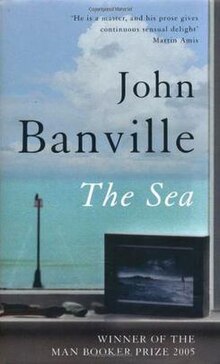The Sea (novel)

The Sea book cover
|
|
| Author | John Banville |
|---|---|
| Country | Ireland |
| Language | English |
| Genre | Novel |
| Publisher | Picador |
|
Publication date
|
3 June 2005 |
| Media type | Print (Hardcover & Paperback) |
| Pages | 200 pp (hardcover) |
| ISBN | |
| OCLC | 60419387 |
The Sea (2005) is the eighteenth novel by Irish writer John Banville. It won the 2005 Man Booker Prize.
The story is told by Max Morden, a self-aware, retired art historian attempting to reconcile himself to the deaths of those whom he loved as a child and as an adult.
The novel is written as a reflective journal; the setting always in flux, wholly dependent upon the topic or theme Max feels inclined to write about. Despite the constant fluctuations, Max returns to three settings: his childhood memories of the Graces—a wealthy middle-class family living in a rented cottage home, the "Cedars"—during the summer holidays; the months leading up to the death of his wife, Anna; and his present stay at the Cedars cottage home in Ballyless—where he has retreated since Anna's death. These three settings are heavily diced and impromptly jumbled together for the novel's entire duration.
Max's final days with Anna were awkward; Max does not know how to act with his soon-to-be-dead wife. Scenes of Anna's dying days are more full of commentary than with actual details, as are most of the novel's settings. It's through these commentaries that we learn of Max's choice to return to the cottage of his childhood memories (after Anna's death), confirming that a room would be available for residence during a visit with his adult daughter, Claire.
We learn of the Cedars' current house-maid, Miss Vavasour, and her other tenant: a retired army Colonel, often described as a background character (even during his important role in the denouement). The Colonel is also seen, at the beginning of Max's stay, to have a crush on Miss Vavasour; Max suspects Miss Vavasour had entertained the Colonel's slight infatuation prior to Max's own arrival.
Despite the actual present day setting of the novel (everything is written by Max, after Anna's death, while he stays in the Cedars' house), the underlying motivation to Max's redaction of memories, the single setting which ties the novel together, are Max's childhood memories. With Max's unreliable, unorganised and omitted iteration of events, we gradually learn the names of the Graces: Chloe, the wild daughter; Myles, the mute brother; Connie, the mother; Carlo, the father; and finally the twins' nursemaid, Rose. After brief encounters, and fruitless moments of curiosity, Max becomes infatuated with Connie Grace upon first sight; seeing her lounging at the beach launches him to acquaint Chloe and Myles in, what Max stipulates to have been a conscious effort to get inside the Cedars, hence, closer to Mrs. Grace. He succeeds. Later, Max recounts being invited on a picnic—for what reasons or what specific time during the summer is never explicitly stated—where Max, in awe, catches an unkempt glance at her pelvic area. This day of "illicit invitation" climaxes when Max is pulled to the ground, and snuggled closely with Connie and Rose in a game of hide-and-seek.
...
Wikipedia
